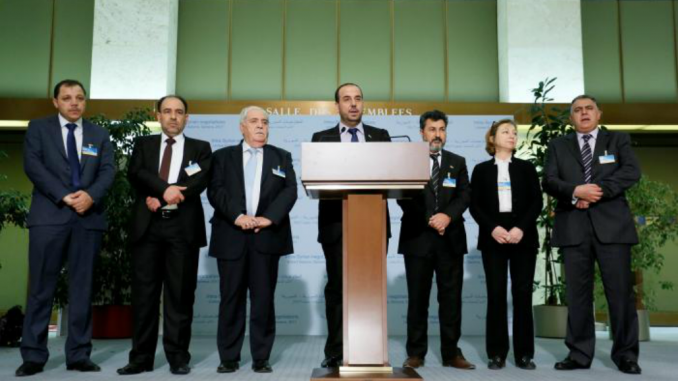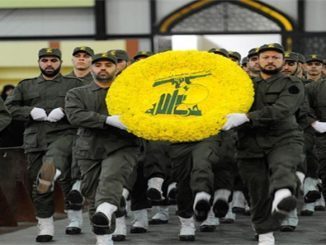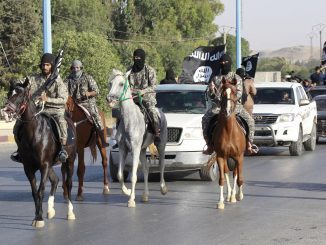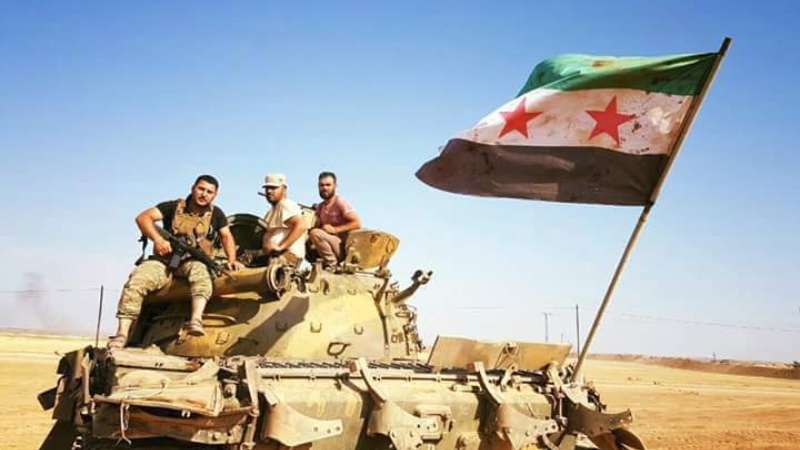
Russia accused the main Syrian opposition group at peace talks in Geneva of seeking to undermine the peace talks, a day after the opposition delegation met Russian foreign ministry officials.
The new round of Syria peace talks has started in Geneva on February 23. after it was previously planned to be on February 8. but delayed in order to take advantage of the results of Astana settlement about the ceasefire in Syria, which was planned by Russia, Turkey, and Iran.
The UN special envoy for Syria, Staffan de Mistura, addressed the both delegations asking them to work together to help in ending the crisis in the country.
De Mistura told the representatives of both delegations that they had a joint responsibility to end a conflict that had killed hundreds of thousands and displaced millions.
During the talks, the opposition’s delegation accused the regime delegation of seeking to hinder the peace talks as its head said the main goal of the talks should be combating terrorism without mentioning the political process, while regime forces in Syria kept breaching the ongoing shaky truce and killed dozens of civilians since the talks started.
In addition, the opposition pledged Russia to play its role as a guarantee of the truce and use its influence over the regime to force it to accept the political solution.
Change in Russia’s language
Representatives of the main Syrian opposition delegation met with Russian Deputy Foreign Minister Gennady Gatilov on Wednesday to discuss what it says are Moscow’s broken ceasefire promises and put pressure on the regime delegation.
After the meeting, the opposition’s lead negotiator Nasr al-Hariri told reporters on Wednesday that the meeting with Gatilov had been positive with a frank exchange on issues ranging from the ceasefire to political transition and fighting terrorism.
However, the Russian declaration expressed the contrary.
Gatilov said that the HNC is not the only one platform presented at the talks, adding that there is no confidence that a unified delegation will be formed any time soon.
“We called for it and said that the HNC is an important element in the negotiations process, but not the only one, since there are other platforms, namely Moscow and Cairo platforms, which are represented in Geneva, and even offered to meet with the colleagues to discuss the possibility of creation of a common opposition platform. But I felt that there was no such intention and confidence that it could be achieved as yet,” Gatilov told reporters.
The Russian side also doubted the opposition’s ability to negotiate and reach a final deal.
“Unfortunately, we note that based on the results of the first few days the talks are once again raising questions about the ability of representatives of the Syrian opposition to do a deal,” Foreign Ministry spokeswoman Maria Zakharova told a news briefing in Moscow.
“The so-called High Negotiations Committee is refusing to cooperate equally with the Moscow and Cairo platforms and is in fact sabotaging fully-fledged dialogue,” she said, referring to two smaller opposition groups that curry favor in Moscow.
Spokeswoman Zakharova said Russia was determined to press ahead with the separate track of peace talks in Kazakhstan and was ready to include new participants in those talks, including from the Syrian opposition “who would behave constructively.”
“Some within the opposition said they were extremely disappointed with their meeting with the Russians, who stuck to their stance that the opposition was not united,” said one senior Western diplomat.
“Russia sees an opportunity here to manage the political track in a different way,” said another Western diplomat.
Other than the HNC, there are many other groups that are considered by the UN to be among the opposition including the Kurdish political wing of the YPG forces, the Cairo platform, and the Damascus platform which is backed by Russia.
These groups have doesn’t share the HNC’s view of Syria’s future and have been accused of hindering the political process. Damascus group, for example, is said to unify the opposition figures inside the country. Most of them refused the revolution when it started and formed their delegation after the UN started its political efforts to end the war. The group is supported by Russia, accepts the idea of Assad being in power and back the Russian air campaign against Syrian civilian saying its aim is fighting terrorists.
Was the opposition deceived?
On February 28., Russia used the veto for the seventh time to ban a UN Security Council resolution backed by Western powers that would have imposed sanctions on Assad regime over the use of chemical weapons against civilians.
Salem al-Muslet, a spokesman for the High Negotiations Committee (HNC) representing opposition forces at Geneva peace talks, said that the opposition regretted Russia’s seventh veto on Syria, but planned to meet Russian Deputy Foreign Minister Gennady Gatilov in hopes of convincing Russia to use its influence on Assad.
“We hope that they come here having something in mind to push the political process here in Geneva because, with this regime, we will reach nowhere unless there is a pressure and the only country that can deliver pressure on the regime is Russia,” Muslet said.
Abdul Hakim Bashar, vice president of the National Coalition for Syrian Revolution and Opposition Forces, said that the Syrian opposition’s High Negotiations Committee (HNC) will hold talks Wednesday evening with Russia’s deputy FM.
Bashar revealed that the HNC will focus on three major issues– the ceasefire, a possible attack on Ghouta, and the political solution for Syria.
“We will discuss three topics with the Russians — the ceasefire, a planned attack on Ghouta, and the political solution,” Bashar said.
“Russia offered itself to hold talks in Astana under its patronage, we want Russia to carry out patronage in Geneva too instead of being a side to the negotiations,” he added.
“Counterterrorism is a complicated subject. It could be negotiated here or in Astana… When you make a transitional government, it will be them who will decide how and when to fight terrorism.”
However, how the opposition will react to the latest Russian declarations? Will they continue to seek partnership with Russia and try to fulfill its conditions or will they leave its side and seek other powers who can have similar effect on the ground?
The Syrian crisis began as a peaceful demonstration against the injustice in Syria. Assad regime used to fire power and violence against the civilians and led to armed resistance. 450.000 Syrians lost their lives in the past five years according to UN estimates, and more than 12 million have lost their homes.



